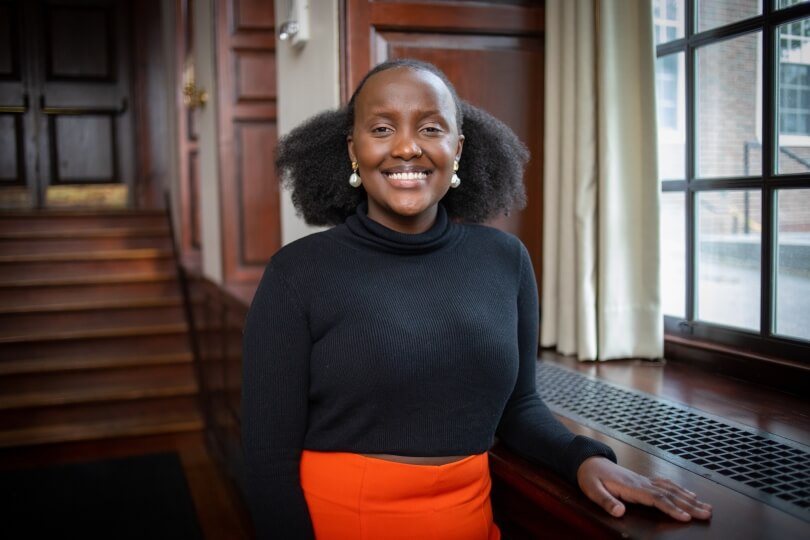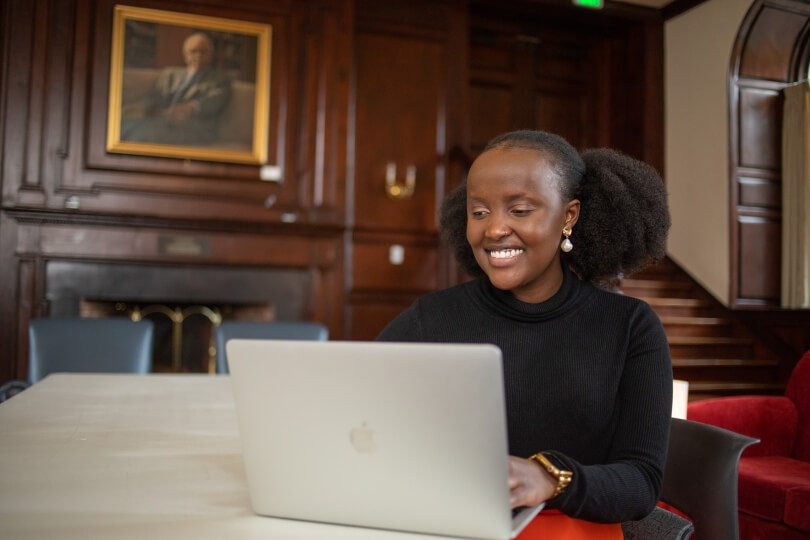Chepchumba Choge, A.B. '23 in computer science and African & African American Studies (Eliza Grinnell/SEAS)
Automated phone messaging services got Chepchumba Choge interested in computer science. As a young girl in her native Kenya, she’d often spend her free time calling customer service numbers, then marveling at how all of them used a similar sounding voice.
“My very young mind couldn’t understand the idea of automation,” Choge said. “I considered the people on the other end of the line as my friends. I remember always feeling like they must be so tired, because whenever I called, it was always the same voice.”
Wanting a broader academic experience than what the Kenyan education system offered, Choge arrived at Harvard in the Fall of 2018, her first time in the United States. She always planned to study computer science at the Harvard John A. Paulson School of Engineering and Applied Sciences (SEAS), but a freshman seminar on artificial and natural intelligence opened her eyes to how computers and technology interact with social justice issues.
“We started learning about the iPhone 10, and how within the Black community there was a recurring issue where either you’d try to get into your phone and it wouldn’t recognize you, or it would recognize someone else’s face as yours,” she said. “I’d only moved to the U.S. a couple months before and was still coming to terms with my own racial identity as a Black woman. That case study made me think about all the times someone has mistaken me for another person in my class who looks nothing like me, and how the biases that exist in the physical world are inadvertently getting passed onto our technology. I realized that algorithms are not neutral. They have the potential to propagate harm.”
That freshman seminar started Choge down an academic path in which she’s always tried to bridge technology and social justice. She’ll graduate with joint degrees in computer science and African & African American Studies – a rare combination at Harvard – with a secondary in The Studies of Women, Gender and Sexuality. She also spent her senior year as an undergraduate Fellow in the SEAS Office of Diversity, Inclusion, and Belonging (DIB), driven by the belief that one way to overcome racial bias in technology is to diversify the workforce creating it.
“This was a culmination of my interest in increasing fairness and equality in data and technology by increasing diversity and representation,” Choge said. “Mirroring my own experience as an underrepresented minority in my academic career here, I was really passionate about fostering a community of belonging for people who felt like they didn’t belong here.”
Choge worked on multiple projects as a DIB Fellow throughout the year. During Black History Month, she organized a Makerspace event in which students were encouraged to build projects celebrating Black history and culture. During BRIDGE (Building Relationships, Increasing Diversity, and Growing Engineers) Week, a weeklong series of events organized by the SEAS Office of DIB, she ran a screening and discussion of “Coded Bias,” a Netflix documentary about Dr. Joy Buolamwini, the MIT researcher who was one of the first to identify racial bias in facial recognition algorithms.
Along with being a DIB Fellow, Choge is also part of multiple campus affinity and diversity groups, including the African Students Association, Women in Computer Science, Harvard Society of Black Scientists and Engineers, and Society of Women Engineers. She also works as an undergraduate representative and interviewer with the SEAS Task Force on Diversity, Inclusion and Belonging.
“I really value the opportunity to attend a liberal arts college which would allow me to explore my varying intellectual interests with extreme rigor,” Chumba said. “I was very interested in the overlap of STEM and social justice, and Harvard provided an amazing opportunity to merge those interests.”
Chepchumba Choge, A.B. '23, will take her interests in computer science, artificial intelligence and algorithmic fairness to the digital consulting division of McKinsey and Company after graduation. (Eliza Grinnell/SEAS)
Choge’s journey will next take her to Seattle, where she’ll work in the digital consulting division of McKinsey and Company. She spent last summer as a visiting associate with the Boston Consulting Group, and this position will build on the skills she developed there.
“I was interested in McKinsey because they had an established digital arm focused on digital consulting,” she said. “As much as I’m interested in the problem-solving aspect of consulting, I don’t want to leave behind my love of computer science.”
Choge intends to eventually apply to graduate school. She’s been a research assistant with both Harvard Business School and Harvard T.H. Chan School of Public Health, where she worked on projects related to human behavior, health and social policy. Technology and social justice can intersect in all three of those topics, and Choge wants to continue researching how to prevent harm to underrepresented groups.
“It’s been about seeking out opportunities to do actual research with participants, get certified to work with human subjects, and build my research skills,” she said. “In addition to just seeking out research opportunities, I’ve tried to understand how systems work, why policies are the way they are, and why people behave the way they do.”
Press Contact
Matt Goisman | mgoisman@g.harvard.edu

